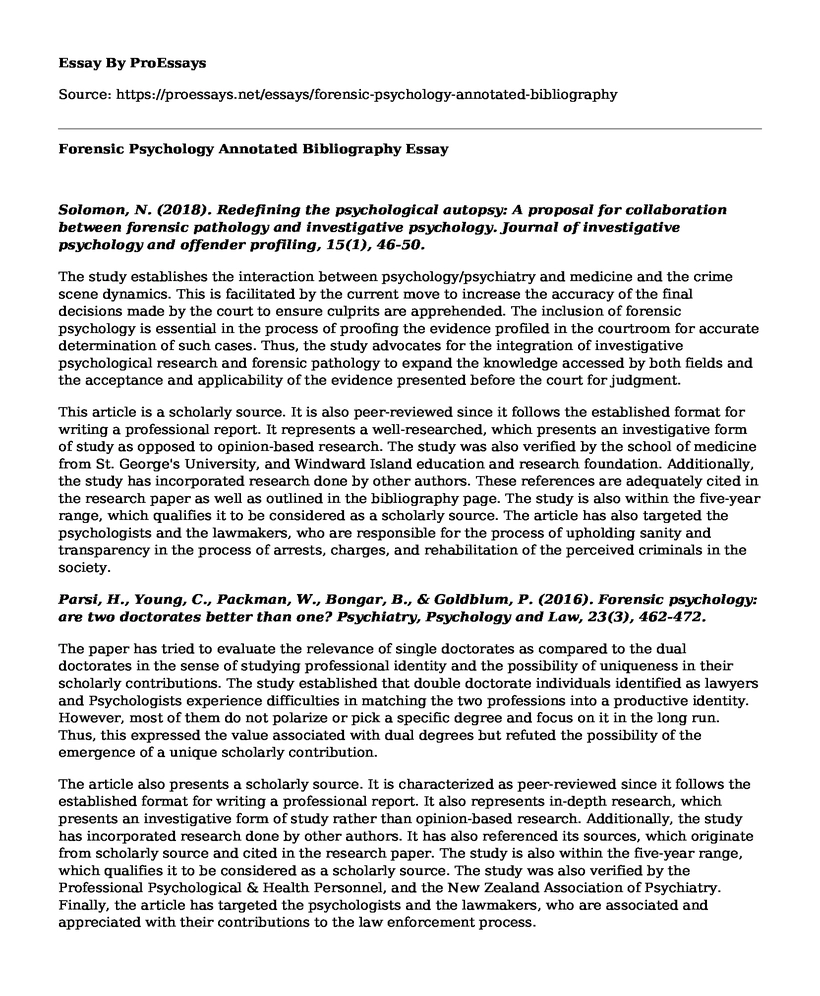Solomon, N. (2018). Redefining the psychological autopsy: A proposal for collaboration between forensic pathology and investigative psychology. Journal of investigative psychology and offender profiling, 15(1), 46-50.
The study establishes the interaction between psychology/psychiatry and medicine and the crime scene dynamics. This is facilitated by the current move to increase the accuracy of the final decisions made by the court to ensure culprits are apprehended. The inclusion of forensic psychology is essential in the process of proofing the evidence profiled in the courtroom for accurate determination of such cases. Thus, the study advocates for the integration of investigative psychological research and forensic pathology to expand the knowledge accessed by both fields and the acceptance and applicability of the evidence presented before the court for judgment.
This article is a scholarly source. It is also peer-reviewed since it follows the established format for writing a professional report. It represents a well-researched, which presents an investigative form of study as opposed to opinion-based research. The study was also verified by the school of medicine from St. George's University, and Windward Island education and research foundation. Additionally, the study has incorporated research done by other authors. These references are adequately cited in the research paper as well as outlined in the bibliography page. The study is also within the five-year range, which qualifies it to be considered as a scholarly source. The article has also targeted the psychologists and the lawmakers, who are responsible for the process of upholding sanity and transparency in the process of arrests, charges, and rehabilitation of the perceived criminals in the society.
Parsi, H., Young, C., Packman, W., Bongar, B., & Goldblum, P. (2016). Forensic psychology: are two doctorates better than one? Psychiatry, Psychology and Law, 23(3), 462-472.
The paper has tried to evaluate the relevance of single doctorates as compared to the dual doctorates in the sense of studying professional identity and the possibility of uniqueness in their scholarly contributions. The study established that double doctorate individuals identified as lawyers and Psychologists experience difficulties in matching the two professions into a productive identity. However, most of them do not polarize or pick a specific degree and focus on it in the long run. Thus, this expressed the value associated with dual degrees but refuted the possibility of the emergence of a unique scholarly contribution.
The article also presents a scholarly source. It is characterized as peer-reviewed since it follows the established format for writing a professional report. It also represents in-depth research, which presents an investigative form of study rather than opinion-based research. Additionally, the study has incorporated research done by other authors. It has also referenced its sources, which originate from scholarly source and cited in the research paper. The study is also within the five-year range, which qualifies it to be considered as a scholarly source. The study was also verified by the Professional Psychological & Health Personnel, and the New Zealand Association of Psychiatry. Finally, the article has targeted the psychologists and the lawmakers, who are associated and appreciated with their contributions to the law enforcement process.
Peer-reviewed articles are essential in ensuring that the researcher utilizes, or is up to date with the current trends and information on their specific academic field. This is due to the fact that for an article to be considered to be peer-reviewed, it has to be within five years range. Therefore, the conclusions made through the use of such information are relevant and applicable in the focus society. Additionally, the information presented has passed through approvals by the mainstream professionals, thus making such articles relevant to the process of studying. Peer-reviewed articles present accurate information, thus reducing the probability of inaccurate conclusions and recommendations. It can also be said that it increased the relevancy of the resulting conclusions and proposals in the affected field.
References
Parsi, H., Young, C., Packman, W., Bongar, B., & Goldblum, P. (2016). Forensic psychology: are two doctorates better than one? Psychiatry, Psychology and Law, 23(3), 462-472. DOI: http://dx.doi.org.ezp.waldenulibrary.org/10.1080/13218719.2015.1080149.
Solomon, N. (2018). Redefining the psychological autopsy: A proposal for collaboration between forensic pathology and investigative psychology. Journal of investigative psychology and offender profiling, 15(1), 46-50. DOI: 10.1080/1068316X.2017.1420188.
Cite this page
Forensic Psychology Annotated Bibliography. (2022, Jul 27). Retrieved from https://proessays.net/essays/forensic-psychology-annotated-bibliography
If you are the original author of this essay and no longer wish to have it published on the ProEssays website, please click below to request its removal:
- Racial Disparity in Incarceration
- Does Oedipus Have Oedipus Complex? Psychology Essay Sample
- Counseling Competency Essay Example
- Paper Example on Four Seasons Washington Loses $1M Jewelry Case
- Prisoners Receiving Free College Education: Pros & Cons - Essay Sample
- Paper Example on CBT: Overcoming Challenges to Achieve Goals
- Paper Example on Reasoning & Decision-Making: Exploring Chapter 12 of Galotti (2017)







